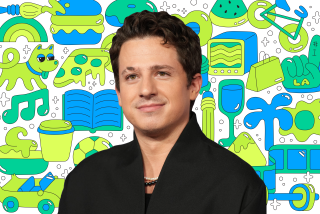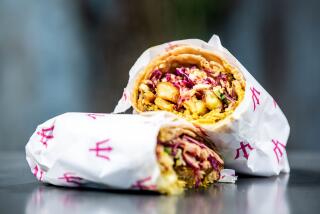Le Cafe’s Steve Bach Grew Tired of Using Music to Sell Burgers
- Share via
Steve Bach grew up on Long Island and played the accordion. He wanted to goto college to study music, so he figured he had better learn the piano. That, he said, took four months. At the music school audition, Bach played Chopin.
“The faculty member who was holding the auditions, needless to say, was singularly unimpressed by my rendition,” Bach recalled. “I said, ‘Wait a minute, let me play you something on the accordion. That’s what I really know how to play.’
“And I performed this ridiculously virtuosic piece which bowled her over. So, I was in.”
From such beginnings, Bach embarked on a varied career in music. After school, he spent two years playing keyboard with jazz bassist Stanley Clarke. Then he wrote jingles for television commercials. He subsequently went on tour with new-age musician Kitaro.
And, over the last two years, Bach, who has made his home in Sherman Oaks, has become a regular at nearby Le Cafe on Ventura Boulevard, where his group performs a brand of fusion.
When Bach is on stage at Le Cafe’s Room Upstairs, the atmosphere is anything but jazz-cool. The nonstop entertainment includes informal chats with the audience. Or sometimes Bach will raffle off one of his albums.
“I enjoy communicating with the audience both musically and verbally,” he said. “For me, the patter is also a part of the show.”
Ten years ago, a freshly schooled Bach came to Southern California because he knew that Clarke lived here. Bach said he had his mind set on becoming a member of Clarke’s band. That, he said, took nine months.
What followed were two years of touring the world, performing for large crowds and playing keyboards on the “Rocks, Pebbles and Sand” recording sessions. Along with the excitement of the big time came a few lessons in jazz.
“He was definitely a major musical influence on me,” Bach said of Clarke. “But he also taught me a great deal about performing. Stanley always expected you to play as hard as you could--not just in terms of decibels--but in intensity.
“Jazz often does have this attitude about being cool, a cigarette dangling from the corner of your mouth, taking 10 minutes between songs to decide what you’re going to do,” Bach said. “That wasn’t Stanley’s bag at all.”
From the world of Monterey and Montreux, Bach turned to industrial films and television commercials. He says he made a handsome income composing scores and jingles.
“It’s the sort of job you end up doing for the rest of your life because you’re good at it, it’s financially rewarding and, in all honesty, it can be quite exciting at times,” he said. “You get a rush when you’re conducting a 30-piece orchestra with some of the finest musicians in L.A. . . . and that’s when ‘Mr. Carl’s’ comes rushing in and asks you to change everything because he’d like you to mention the word ‘hamburger’ just one more time.”
This part of the business finally caught up with Bach.
“One day, it just dawned on me that, here I was, 28 years old and selling hamburgers!”
He returned to the precarious life of a performance musician, wondering how he was going to support his wife and 1-year-old son, Sebastian.
In the two years since, Bach has managed to release a solo piano album (“Child’s Play”) and two group efforts (“Holiday” and “Zero Gravity”). These records have earned air play on KTWV-FM (94.7) and KKGO-FM (105.1).
Bach has also spent much of his time playing gigs. In a few weeks, he will travel to New York, London and South America on tour with Brazilian percussionist Airto and vocalist Flora Purim.
Airto and Purim first became familiar to American audiences when they recorded with Chick Corea in the early 1970s. Since then, Airto’s percussion prowess has been consistently hailed by such magazines as Downbeat and Modern Drummer.
Bach is enthusiastic about playing with the Brazilian duo. Kitaro’s high-tech wizardry left little room for keyboard improvisation. With Airto and Purim, Bach will get a chance to show his stuff.
“Airto expects his musicians to take the music in a new direction every night,” he said. “Nothing is ever pat or stale. This is just the sort of environment I need to grow and evolve as a musician.”
And that might make for some interesting evenings when Bach returns to Le Cafe in March.
More to Read
The biggest entertainment stories
Get our big stories about Hollywood, film, television, music, arts, culture and more right in your inbox as soon as they publish.
You may occasionally receive promotional content from the Los Angeles Times.










